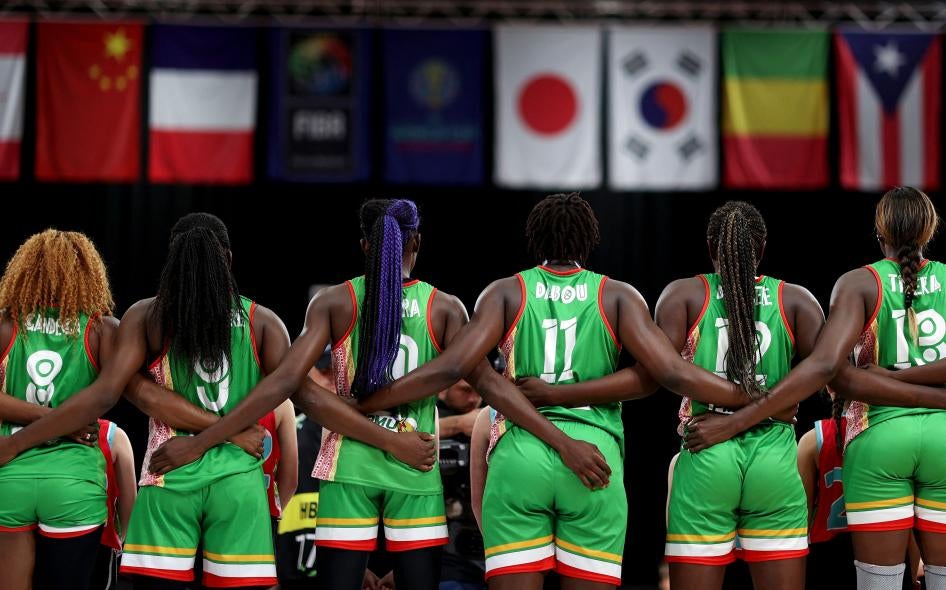(New York) – The International Basketball Federation’s (FIBA) sanctions on top women’s basketball officials in Mali confirm the responsibility to remedy systemic abuse of young athletes, Human Rights Watch said today. But the appointment of another official suspected of abuse as head of the Mali Basketball Federation (FMBB) raises concerns that continuing monitoring by FIBA and the International Olympic Committee is urgently needed.
On June 21, 2023, FIBA issued a lifetime ban on Amadou Bamba, the former Mali women’s national basketball team coach, and sanctions on four other top officials. Sanctioned officials include the former national federation president, Harouna Maiga. In June 2021, Human Rights Watch had issued a report about sexual extortion of children and cover-ups of abuse in the FMBB.
“FIBA’s own report confirmed the systemic abuse of teenage female basketball players in Mali dating back years,” said Minky Worden, director of global initiatives at Human Rights Watch. “While it’s important that some top officials were sanctioned, there has been no remedy or compensation for teenage girl athletes who brought complaints and faced retaliation, while an implicated official now runs basketball in Mali.”
After Human Rights Watch and the New York Times documented sexual abuse in Mali basketball, FIBA appointed the Canadian lawyer and FIBA integrity officer, Richard McLaren, to conduct an independent investigation. McLaren’s 149-page report, released in September 2021, verified accounts of sexual exploitation, extortion, and retaliation within the FMBB, revealing an “institutionalized acceptance of sexual abuse.”
But the former FMBB president, Jean-Claude Sidibé, whom the McLaren Report alleged had threatened witnesses and violated FIBA’s supposed “zero tolerance” policy for sexual abuse, was again named the president of the Mali Basketball Federation in December 2022.
The McLaren report’s recommendation that FIBA’s Disciplinary Commission should review the evidence it compiled against Sidibé and assess his suitability to be a candidate for any official positions has apparently been ignored.
In July 2021, Malian authorities arrested and indicted Bamba, then the head coach of Mali’s under-18 women’s national basketball team, who is awaiting trial for “pedophilia, attempted rape, and molestation.” Additionally, former federation President Harouna Maiga has been handed an eight-year ban on involvement in basketball, former Secretary General Seydou Maiga received a six-year suspension, and former FMBB Vice President Amadou Traore and former assistant coach Fatoumata Diallo got four and two-year suspensions respectively.
FIBA’s sanctions came almost two years after the original complaints by teenage basketball players. As Human Rights Watch and the Sport & Rights Alliance have documented, those players did not receive confidentiality, trauma support, or witness protection.
“Without a survivor-centered approach and trauma-informed process, children, parents and athletes will be less likely to report sexual abuse and cover-ups,” Worden said.
FIBA’s McLaren report confirmed that basketball federation officials or others intimidated 22 survivors into not giving evidence to McLaren. The few players who agreed to be interviewed also reported that they were afraid of retaliation. One player reported that the FMBB directly retaliated by removing her from the World Cup national team roster after she and her family reported sexual abuse and a cover-up by the then-president of the national federation.
In March 2023, Women’s National Basketball Association (WNBA) players demanded justice in a video, calling for FIBA to end sexual abuse in basketball and protect young players in Africa.
But two years after the McLaren report’s publication, survivors and whistleblowers still live under threat and cannot safely play. A teenage whistleblower faced threats and lost career opportunities after reporting sexual abuse and has subsequently sued the federation for failing to protect her from retaliation.
Hamane Niang, the former president of the FMBB who led the federation while this abuse was happening, has returned to his post as FIBA president.
All Mali government institutions with jurisdiction over the issue, including the justice system, the Ministry of Youth and Sport, the FMBB, and FIBA, should investigate the abuses and cover-up, now that the FIBA sanctions have been announced. The Youth and Sport Ministry should form a government commission of inquiry to impartially investigate systemic sexual abuse in girls’ basketball and other girls’ sports in Mali.
The ministry should also act to ensure that players do not face retaliation for making complaints, and work with women’s rights and healthcare providers with expertise in sexual abuse and trauma so that survivors have access to long-term, quality support services.
Although FIBA has taken steps to develop a new safeguarding policy and has set up a Safeguarding Council, there is no clear way for athletes to safely report abuses to these bodies, Human Rights Watch said.
The failures in FIBA’s process, including the McLaren investigation’s endangering survivors, are symptomatic of foundational flaws in FIBA’s governance, structure, and responsibilities to basketball players.
With the Youth Olympics coming to Dakar, Senegal in 2026, FIBA has an opportunity to implement human rights in their operations, impose a safeguarding policy throughout the many federations it oversees, put in place background checks for federation leaders to exclude abusers, and compensate women and girls who came forward to report abuse.
“The sanctions by FIBA vindicate the past and present players, survivors, whistleblowers, and activists who took enormous risks to bring this abuse to light,” Worden said. “However, more needs to be done to protect the young players who continue to face threats and retaliation.”









